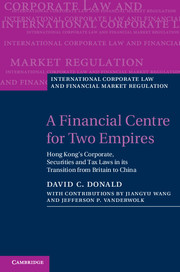 A Financial Centre for Two Empires
A Financial Centre for Two Empires Book contents
- Frontmatter
- Contents
- List of figures
- List of tables
- Preface
- 1 History’s marks on Hong Kong law
- 2 Hong Kong’s economic structure
- 3 Hong Kong corporate and securities laws in response to the Region’s role as China’s international financial centre
- 4 The role of Hong Kong’s tax policies
- 5 Enforcement of corporate and securities law in Hong Kong
- 6 China’s impact on Hong Kong’s position as an international financial centre
- References
- Index
2 - Hong Kong’s economic structure
The corporate control context
Published online by Cambridge University Press: 05 June 2014
- Frontmatter
- Contents
- List of figures
- List of tables
- Preface
- 1 History’s marks on Hong Kong law
- 2 Hong Kong’s economic structure
- 3 Hong Kong corporate and securities laws in response to the Region’s role as China’s international financial centre
- 4 The role of Hong Kong’s tax policies
- 5 Enforcement of corporate and securities law in Hong Kong
- 6 China’s impact on Hong Kong’s position as an international financial centre
- References
- Index
Summary
The dominance of substantial shareholders
The history of Hong Kong discussed in Chapter 1 has cut a path of development in which private ordering by both British and Chinese merchants greatly controlled the shape of the Hong Kong economy, society and government, which left the regulatory actions and interventions of government minimal. It has also been a history of providing services outward towards foreign partners, both in trade and in finance, first in the context of the British Empire and later within the Chinese economy. Britain and the Commonwealth were the sources for the development of much of Hong Kong’s common law, meaning that the doctrines and principles found in this body of law are not always well adapted to the local circumstances of Hong Kong. While this relationship is no longer binding post-1997, the path dependence of Hong Kong’s history is very strong in this regard. On the other hand, the relationship with China has been a constant in Hong Kong’s history that varied in shape and intensity as a factor of the state of political affairs in China. At times Hong Kong has thrived from its relationship with China and at other times it has thrived because China chose to implement policies that crippled its productive capacity and engagement in international trade, such as during the third quarter of the twentieth century when Hong Kong (together with Taiwan) briefly became China’s ersatz manufacturing hub.We thus understand that the Region called Hong Kong presents a very complex phenomenon – absorbing and adapting British institutions while reacting and adjusting itself in relation to China’s, Asia’s and indeed global developments.
- Type
- Chapter
- Information
- A Financial Centre for Two EmpiresHong Kong's Corporate, Securities and Tax Laws in its Transition from Britain to China, pp. 54 - 103Publisher: Cambridge University PressPrint publication year: 2014
